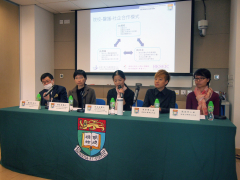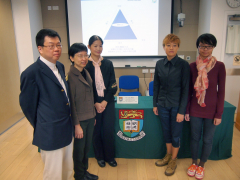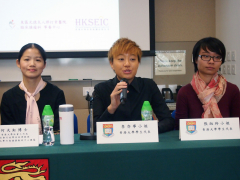Media
Cancer Survivors and Local College Students
“Life and Death Education Training and Service Program”
Report on Program Effectiveness and Future Development
01 Nov 2012
A University of Hong Kong Knowledge Exchange Fund supported project to promote academic-medical-social enterprise collaboration.
During the summer of 2012, the Department of Social Work and Social Administration and the Centre on Behavioral Health of the University of Hong Kong; the Pamela Youde Nethersole Eastern Hospital; and the Hong Kong Social Enterprise Incubation Centre jointly provided a Life and Death education and training course to cancer survivors and local college students and arranged them to visit and accompany terminally ill patients after the training. The organizing committee held a press conference at the Centre on Behavioral Health today (November 1) to explain the program and outcomes. Two student representatives shared their feelings and experiences about the training and service program. Families of the benefited terminally ill patients also shared their feelings through video recordings.
The course was comprised of two parts. The first part was about Life and Death Education. Ms. Venus Wong, Teaching consultant, HKU Department of Social Work and Social Administration; and Ms. Agnes Tin, Teaching consultant, HKU Centre on Behavioral Health provided a 4-session (12 hours) training on life and death education for cancer survivors and college students. This included teaching participants about the Five Stages of grief when facing death, the needs of terminally ill patients and some effective communication skills. Besides, participants were encouraged to cherish their life, learnt to use a positive attitude to face everyday encounters and live gratefully.
The second part of the program was service-oriented. Under the arrangement of the Medical Social Worker of the Clinical Oncology Department of the Pamela Youde Nethersole Eastern Hospital, cancer survivors applied the knowledge and communication skills they learnt in real-life settings. They visited other cancer patients, made use of their own experiences to provide informative and psychological support to them. On the other hand, college students completed the service at the patients’ homes. In the process, students tried to understand more about the terminally ill patients and made a unique life-book with them.
Dr. Rainbow Ho, Assistant Professor of HKU Department of Social Work and Social Administration and Director of HKU Centre on Behavioral Health, pointed out at the press conference that after the end of the course, students’ altruistic behavior, sense of social responsibility, sense of ability to help others and the overall sense of well-being have been improved. In addition to quantitative measures, two focus group interviews were conducted before and after the training. It has been revealed that after the training, students tend to focus more on here-and-now. They understand the importance of timely action, and are more able to effectively allocate their time and more willing to spend time with their families. Apart from self-reflection, students are also aware of the inadequacy of current university curriculum.
Dr Ho further suggested that life and death education should be included in formal curriculum, so that students will have the opportunity to reflect on their life and prioritize their life goals. They have also noted from the visiting service that the care for terminally ill patients and their families are currently insufficient, and are in the opinion that the Government should devote more resources to improve the quality of hospice care service.
According to Dr. Ho, the training and service program is just a pilot project. In the future, she hopes there will be more opportunities for “academic-medical-social enterprise” collaboration which can promote life and death education and respond to the pressing needs in this area. She would like to thank the University of Hong Kong Knowledge Exchange Fund for the support to this program, as well as the Pamela Youde Nethersole Eastern Hospital Clinical Oncology Department and the Hong Kong Social Enterprise Incubation Centre for the collaboration.
Dr. Rebecca Yeung, Chief of Service of the Department of Clinical Oncology, Pamela Youde Nethersole Eastern Hospital, has hoped that through this program, the community would have a better understanding of hospice care and support the service, so that terminally ill patients could get more appropriate physical, psychological, social and spiritual care. Dr Yeung added that by training cancer survivors to use their own experiences to help and support terminally ill patients, more terminally patients would receive support and at the same time, survivors themselves would develop more positive psychological traits during the process.
Mr. Raymond Yim, Founding Director of the Hong Kong Social Enterprise Incubation Centre, said the program was a pilot study and was the first academic-medical-social enterprise collaboration in Hong Kong. He plans to promote this program to different hospitals in Hong Kong, to attract more cancer survivors and college students to participate in the scheme so as to benefit more terminally ill patients. Mr Yim hopes future collaboration can be funded by surplus of social enterprises, which are playing the role not only as supporters of the community but also facilitators to help reduce welfare spending of the Government.
For details of the program, please contact:
Ms. Amy Choi, Senior Executive Assistant, HKU Centre on Behavioral Health (Tel: 2831 5163 / email: amychoi@hku.hk); or Ms. Joyce Sing, Research Assistant, HKU Centre on Behavioral Health (Tel: 2831 5216 / email: singcy@hku.hk ).



